The Convocation is being held in the backdrop of a historic development – IIT Madras launching the first-ever international campus an IIT in Tanzania-Zanzibar
 KRC TIMES Education Desk
KRC TIMES Education Desk
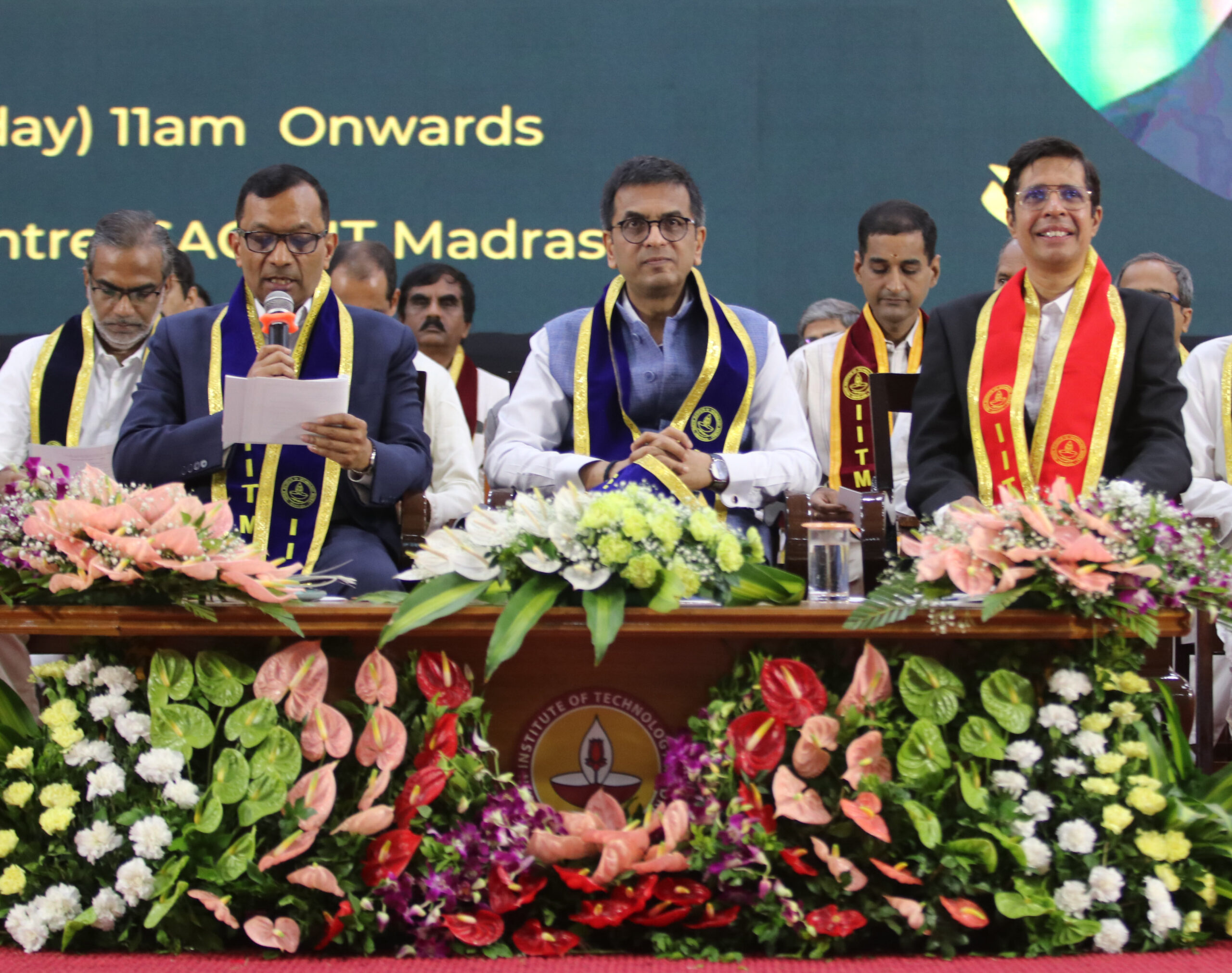
CHENNAI : A total of 2,573 students graduated during the 60th Convocation of Indian Institute of Technology Madras (IIT Madras), which was held in the campus today (22nd July 2023). As many as 2,746 degrees (including Joint and Dual Degrees) were awarded to the students on the occasion.
The Convocation is being held in the backdrop of a historic development – IIT Madras launching the first-ever international campus an IIT in Tanzania-Zanzibar.
The Convocation Event can be viewed on the following link – https://www.youtube.com/watch?v=4dEOWRC97S0
A total of 453 PhDs were awarded, which included PhDs, Joint Degree Ph.Ds with foreign institutions and Dual Degree PhDs.
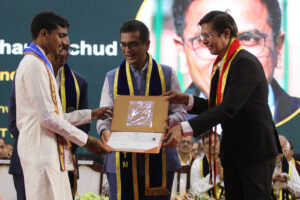
The Chief Guest was Dr. Justice Dhananjaya Y Chandrachud, Chief Justice of India. Dr. Pawan Goenka, Chairman, Board of Governors, IIT Madras, presided over the Convocation in the presence of Prof. V. Kamakoti, Director, IIT Madras, faculty, staff and students.
Congratulating the graduating students and prize winners, Dr. Justice Dhananjaya Y Chandrachud, Chief Justice of India, said, “Over the past 64 years, this university has contributed significantly to India’s development true its research, innovations, technological innovations and advancements. In a true sense, institutions such as IIT Madras have transformed Indian Society by entrenching the scientific approach and temper in our society.
As I think about the history of this institution, I think about the 1,000s of the students who have graduated from his hallowed university and made not ony our nation but the world a better place. And today, I can see the bright future of the India in your shimmering eyes.”
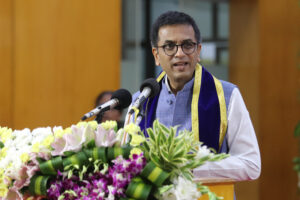
Dr. Justice Dhananjaya Y Chandrachud added, “I congratulate all the graduating students… Even though you are leaving this institution, a part of it will always stay with you. Its values and its principles will guide and motivate you. I would also like to congratulate your families who made sacrifices for your upbringing and education.
It is often said that technology develops at a speed which the law cannot keep up with. This may seem true at the heat of the moment but if we take a step up back, our history is a testament to the fact that law and technological developments share a dialectic relationship. They speak to one another constantly, each one pushing the other forward.”
“Today, I want to leave you with two questions that I hope you will ask yourselves – What are the value your technology represents and what are its affordances. When I say ‘value,’ I do not mean the monetary worth of your ideas, innovations or technology. I mean what principled values the technology represents and in particular, what are the values it furthers in the context you seek to deploy it,” said Dr. Justice Dhananjaya Y Chandrachud.
DEGREES BREAK-UP
During this Convocation, Prof. V. Kamakoti, Director, IIT Madras, awarded degrees to 2,573 graduates including 675 B.Tech (of whom 36 with Honours), 407 Dual Degree B.Tech and M.Tech, 442 M.Tech, 147 M.Sc, 46 M.A, 49 Executive MBA, 67 MBA, 200 M.S, 453 PhD and 70 Web-enabled M.Tech for executives. The above PhD numbers also include 19 joint degrees with universities in foreign countries including Australia, Singapore, France and Germany.
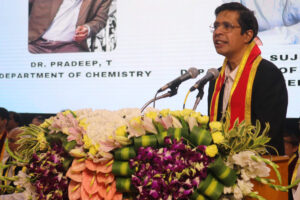
Congratulating the graduating students, Dr. Pawan Goenka, Chairman, Board of Governors, IIT Madras, said, “I have reached a personal milestone today as I am presiding over my 10th convocation ceremony of IITM as Chairperson of the BOG. Let me highlight a few things that have changed and not changed during this time at IIT Madras.
What has not changed is the rigor in student admissions, faculty selection, and passion of faculty & staff to do all that they can to graduate the best engineering students in India and perhaps in the world. IITM has been blessed with having amongst the best directors in the IIT system. I have had the privilege to work with Dr. Bhaskar Ramamurthi for eight years and now Prof V Kamakoti.”
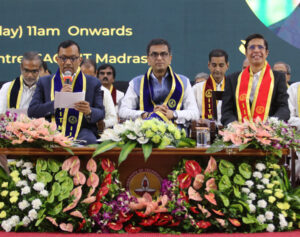
Further, Dr. Pawan Goenka said, “What has changed is a greater thrust on R&D. The total R&D funding has gone up from about Rs 250 crores to Rs 2,000 crores in ten years and what is even more encouraging is that forty percent of it comes from the industry.
IITM Research Park, which was the brainchild of Prof. (Ashok) Jhunjhunwala and Dr. (Bhaskar) Ramamurthi has become a benchmark for all IITs to follow. Entrepreneurship amongst graduating students and even professors has almost gone viral. Number of deep-tech startups incubating from IITM is perhaps the highest of any institute in India. Ather Energy is one such example.”
IIT Madras was designated as an ‘Institute of Eminence’ in early 2020. The special grant that came with it was primarily being used to give a sharp impetus to research activities. Through an internal competitive process, the Institute identified for support nearly many research initiatives grouped under clusters, ranging from AI and Data Sciences to Safety Science and Systems, and Sensing and Vision.
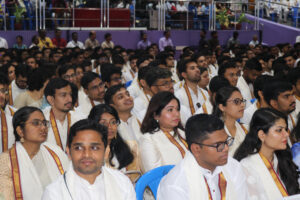
Presenting the Director’s Report, Prof. V. Kamakoti, Director, IIT Madras, said, “As an Institute of national importance and in consonance with our Strategic Plan we are focusing more on ‘local relevance leading to global excellence’ to make ‘IITM for All’/‘Anaivarukkum IITM’.
We have, therefore, rolled out several initiatives that will focus on reaching out to the rural India through the Section 08 company hosted by IIT Madras and housing the Technology Innovation Hub funded by the Department of Science and Technology under its National Mission on Cyber Physical Systems, IIT Madras Pravartak Technologies Foundation.”
Prof. V. Kamakoti added, “Kalvi Shakti and Vidya Shakti, are such initiatives that reach 12000 school students from 5th to 12th grades, in Tamil Nadu and Uttar Pradesh. Science, Mathematics and English are taught through live online classes in Tamil and Hindi medium. They have rural Interaction Centers (RICs) in 89 villages in Tamil Nadu and 100 villages in Uttar Pradesh.
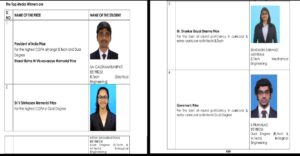
The tutors use virtual reality lessons to teach 2,500 school students; and demonstrate science experiments face to face, to 3,200 students. This innovative approach has increased the attention and retention spans in children significantly, that is evident from the 98% passing rate in the RICs across all grades. The RIC initiative is to be expanded to 8 more States and 1000 RICs in future.”
Following the Main Convocation in the morning, Department Degree Distribution Programmes (D3P) were held in the 16 academic departments, where graduating students were conferred their degrees in person.


